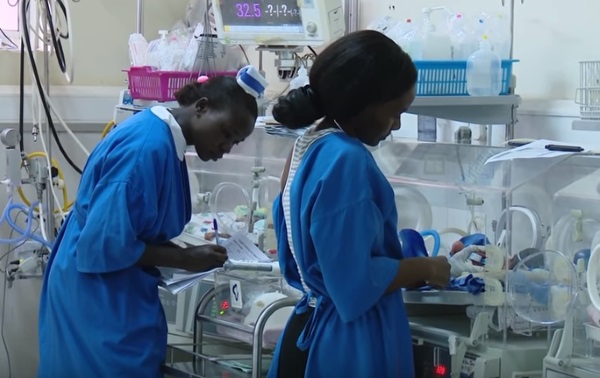Rose Nakato gave birth to these triplets who were born as prematures. We found Nakato at Nsambya Hospital on Friday where she was invited by the Pediatrics Department as a guest to share her success story on raising premature. The function was a fundraising for a Breast Milk Bank to benefits mothers of premature. On the sidelines of the event, Nakato told NTV what she went through after the unfortunate incident last year. “It was so frightening because thinking of three babies was really terrible. When I got contractions I thought maybe they were coming; it was a sealed birth. And when I went they told me there were three live baby boys, they took them to ICU and I was taken back to my ward.” Said, Rose Nakato – Preterm Mother.
One of her biggest challenges at the time was lack of breast milk for her babies. “After some days I got a call and they said they wanted breast milk. I said now where should I get the milk, I began expressing but there was nothing. We did all things possible but we could produce even a drop of milk.” Frequent breastfeeding is one of the feasible and most cost-effective ways of saving the life of a premature. Others include the Kangaroo Mother Care where the babies carried by the mother with skin to skin contact and use of antibiotics to treat newborn infections. “So the doctors talked to me and they said if I did not have the milk maybe I could get a donor. This is still something that I have never had of.” A Good Samaritan came to Nakato’s rescue; a nurse at the hospital who had just delivered agreed to donate some of her breast milk to her three babies. “If my babies wanted three bottles, she could give me one and I could produce my own two.” Breast milk donation is done locally by Nsambya hospital on a consent basis which continues even after discharge. “But still even when we went home she continued for one other month.”
“Sometimes these mothers especially when they have blood pressure, by the time they deliver they are unconscious, they themselves are not well. They are not going to give you breast milk.” Said, Dr. Victoria Nakibuuka – Neonatologist, Nsambya Hospital. This is why Nsambya Hospital decided to put up a Breast Milk Bank. “It is basically collecting extra milk from other mothers, we store it and make it safe to give out to other babies that are vulnerable whose mother may not able to give us enough breast milk.” Said Dr. Victoria.
Figures from the World Health Organization showed that every year approximately 1 million children died due to complications of preterm birth. “We basically have to have a strict criteria for selecting the donors. Number one; is to screen for infections. The infections that we screen for are HIV, Hepatitis, CMV, and Syphilis.” Said, Dr. Victoria. Dr. Ritah Nazziwa, a Pediatrician at Nsambya Hospital said that preterm births are triggered by a condition that causes the pregnant woman’s uterus to get contractions. “If a mother has hypertension, some mothers have hypertension even before pregnancy what we call chronic hypertension. And then, there is what we call Pre-Eclampsia or hypertension due to a pregnancy. We have what we call Placenta Previa where this Placenta is located in a wrong place. Then we have such things like trauma; like a mother gets an accident or fights at home and also the uterus gets into contractions. And even not forgetting stress.”
Dr. Nazziwa said that recent studies also showed that fibroids and giving birth at a later stage could be another cause. And in almost all countries with reliable data, preterm birth rates are increasing. Many survivors suffer a lifetime disability including learning disabilities and visual and hearing problems. More than 60% of preterm births occur in Africa and South Asia. Malawi, Comoros Islands, Zimbabwe, Equatorial Genie and Mozambique are among the top ten countries with the highest preterm birth rates per 100 live births in the world.
“One main thing for premature is to survive, is to provide warmth, cover up this baby well because they have come out at the wrong time.” Said, Dr. Nazziwa. A Breast Milk Bank once constructed would help to provide for the needy and save more babies who at times die due to lack of exclusive breastfeeding. “In case this thing grows we can even send milk to other places like other hospitals that will need the milk.” Said Dr. Victoria. Some countries like Kenya and South Africa have established these banks.

